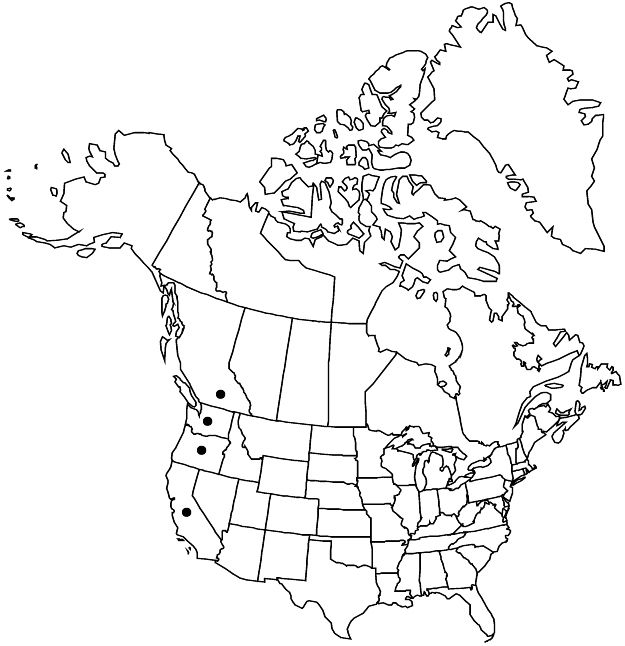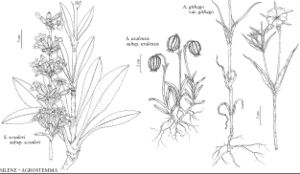Difference between revisions of "Silene scouleri subsp. scouleri"
FNA>Volume Importer |
FNA>Volume Importer |
||
| Line 8: | Line 8: | ||
|name=Silene grandis | |name=Silene grandis | ||
|authority=Eastwood | |authority=Eastwood | ||
| − | }}{{Treatment/ID/Synonym | + | }} {{Treatment/ID/Synonym |
|name=Silene pacifica | |name=Silene pacifica | ||
|authority=Eastwood | |authority=Eastwood | ||
| − | }}{{Treatment/ID/Synonym | + | }} {{Treatment/ID/Synonym |
|name=Silene scouleri subsp. grandis | |name=Silene scouleri subsp. grandis | ||
|authority=unknown | |authority=unknown | ||
| − | }}{{Treatment/ID/Synonym | + | }} {{Treatment/ID/Synonym |
|name=Silene scouleri var. pacifica | |name=Silene scouleri var. pacifica | ||
|authority=(Eastwood) C. L. Hitchcock | |authority=(Eastwood) C. L. Hitchcock | ||
| Line 32: | Line 32: | ||
|elevation=0-3800 m | |elevation=0-3800 m | ||
|distribution=B.C.;Calif.;Oreg.;Wash. | |distribution=B.C.;Calif.;Oreg.;Wash. | ||
| − | |discussion=<p>Although subsp. scouleri is primarily a taxon of the Pacific coast and foothills, plants approaching this subspecies occur at higher elevations in Idaho, Wyoming, and the interior of Washington and Oregon. However, the characters of plants of this subspecies growing in inland habitats often tend to be less extreme than those in plants from near the coast.</p> | + | |discussion=<p>Although <i></i>subsp.<i> scouleri</i> is primarily a taxon of the Pacific coast and foothills, plants approaching this subspecies occur at higher elevations in Idaho, Wyoming, and the interior of Washington and Oregon. However, the characters of plants of this subspecies growing in inland habitats often tend to be less extreme than those in plants from near the coast.</p> |
|tables= | |tables= | ||
|references= | |references= | ||
| Line 56: | Line 56: | ||
|publication year= | |publication year= | ||
|special status= | |special status= | ||
| − | |source xml=https://jpend@bitbucket.org/aafc-mbb/fna-data-curation.git/src/ | + | |source xml=https://jpend@bitbucket.org/aafc-mbb/fna-data-curation.git/src/8f726806613d60c220dc4493de13607dd3150896/coarse_grained_fna_xml/V5/V5_415.xml |
|subfamily=Caryophyllaceae subfam. Caryophylloideae | |subfamily=Caryophyllaceae subfam. Caryophylloideae | ||
|genus=Silene | |genus=Silene | ||
Revision as of 17:38, 18 September 2019
Stems ± unbranched, stout, 20–80 cm, densely puberulent, glandular-puberulent and viscid distally. Leaves: basal petiolate, blade lanceolate to ovate-lanceolate, 6–17 cm × 6–30 mm (including petiole), base cuneate into petiole, apex acute, appressed-puberulent on both surfaces; cauline in (3–)5–8(–12) pairs, distal leaves sessile, reduced, blade lanceolate, proximal oblanceolate. Inflorescences erect, cymose, elongate with 4–12 nodes, each with dense pseudowhorl of (2–)5–20 flowers, densely glandular-puberulent, viscid; both sessile and pedicillate flowers in each cyme, rarely with short, erect peduncle shorter than to equaling calyx; bracts lanceolate, 5–60 mm. Pedicels slender, shorter than to equaling calyx in flower, some to 11/2 times calyx in fruit, densely glandular-pubescent, viscid, some flowers may be sessile. Flowers: calyx tubular to narrowly campanulate and somewhat clavate, (8–)10–15 × 3.5–5 mm in flower, broadening to 5–7 mm and clavate in fruit, constricted at base around carpophore, glandular-pubescent with purple-septate hairs, viscid, veins purplish, lobes lanceolate, 2–4 mm, membranous, margins suffused with purple, apex broadly obtuse and membranous; corolla greenish white tinged with pink to dull pink, claw slightly longer than calyx, broadened distally, ciliate at base, limb ± obovate, 2–4-lobed, 3–5 mm, often with small lateral teeth, appendages 2, oblong, 1–3 mm, margins erose; stamens equaling petals; styles equaling petals. Capsules ovoid, equaling calyx; carpophore 3–6 mm. Seeds gray-brown, reniform, 1–1.5 mm. 2n = 48.
Phenology: Flowering summer.
Habitat: Coastal bluffs, rocky and grassy slopes, dry prairie, woodlands
Elevation: 0-3800 m
Distribution

B.C., Calif., Oreg., Wash.
Discussion
Although subsp. scouleri is primarily a taxon of the Pacific coast and foothills, plants approaching this subspecies occur at higher elevations in Idaho, Wyoming, and the interior of Washington and Oregon. However, the characters of plants of this subspecies growing in inland habitats often tend to be less extreme than those in plants from near the coast.
Selected References
None.
